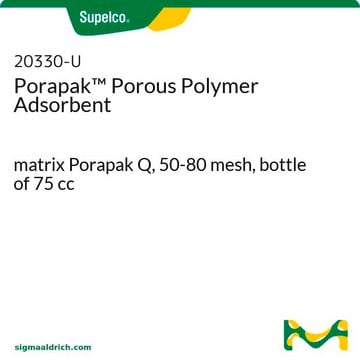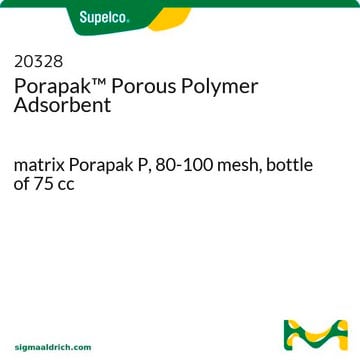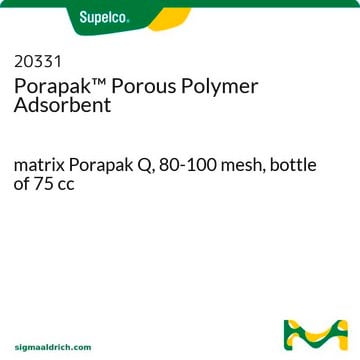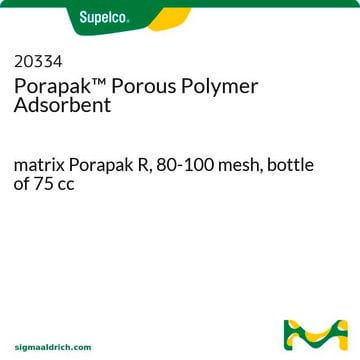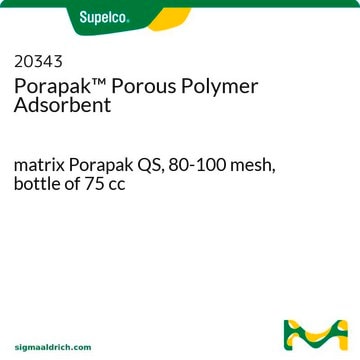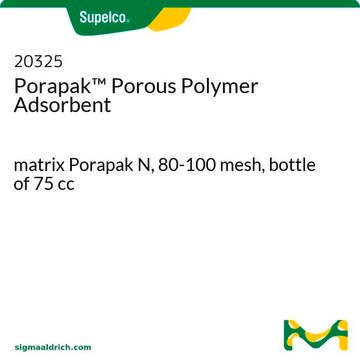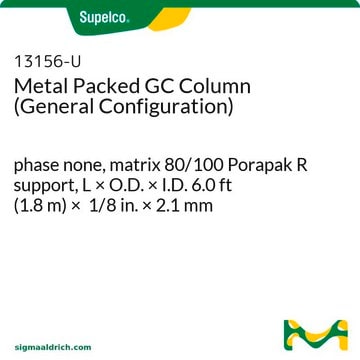추천 제품
양식
solid
포장
bottle of 75 cc
파라미터
250 °C temp. limit
기술
gas chromatography (GC): suitable
표면적
~525 m2/g
Matrix
Porapak R
입자 크기
50-80 mesh
density
~0.32 g/mL (free fall density)
유사한 제품을 찾으십니까? 방문 제품 비교 안내
일반 설명
Porapak porous polymers are spherical beads with consistent particle size, porosity, and surface area that help to insure analytical precision and accuracy.
For more information about any of our adsorbents, please visit sigma-aldrich.com/adsorbents
For more information about any of our adsorbents, please visit sigma-aldrich.com/adsorbents
Porous polymers are the most suitable adsorbent for applications based on the analysis of gases, acids, amines, organics of low carbon number and water.[1] They are best suited for gas chromatography and are basically copolymers of polydivinylbenzene (DVB) which are very porous in nature ranging from mesoporous to microporous.[2] Porapak™ R is a porous polymer composed of vinyl pyrollidone mainly suitable for the separation of ethers and esters.[1]
애플리케이션
Porapak™ R with Amberlite™ XAD-4 maybe useful for chromatographic sampling of polar and nonpolar low-volatility compounds.[3]
법적 정보
Amberlite is a trademark of DuPont de Nemours, Inc.
PoraPak is a trademark of Waters
Storage Class Code
11 - Combustible Solids
WGK
WGK 3
Flash Point (°F)
Not applicable
Flash Point (°C)
Not applicable
개인 보호 장비
Eyeshields, Gloves, type N95 (US)
가장 최신 버전 중 하나를 선택하세요:
Gas Chromatography, 127-130 (2012)
Chromatographic characterization of porous polymers for use as adsorbents in sampling columns.
Butler LD and Burke MF.
Journal of Chromatographic Science, 14 (3), 117-122 (1976)
Grob RL and Barry EF.
Modern Practice of Gas Chromatography, 79-83 (2004)
Jackson P Audley et al.
Journal of economic entomology, 113(6), 2772-2784 (2020-11-03)
The walnut twig beetle, Pityophthorus juglandis Blackman, and its associated fungal pathogen that causes thousand cankers disease, currently threaten the viability of walnut trees across much of North America. During a 2011 assessment of seasonal flight patterns of P. juglandis
Yosuke Funato et al.
Developmental cell, 55(4), 387-397 (2020-09-13)
Extracellular pH is usually maintained around 7.4 in multicellular organisms, and cells are optimized to proliferate under this condition. Here, we find cells can adapt to a more acidic pH of 6.5 and become addicted to this acidic microenvironment by
활성 필터
자사의 과학자팀은 생명 과학, 재료 과학, 화학 합성, 크로마토그래피, 분석 및 기타 많은 영역을 포함한 모든 과학 분야에 경험이 있습니다..
고객지원팀으로 연락바랍니다.